Level 1, 16 University Avenue
Macquarie University NSW 2109
Innovating and transforming hearing health for all
Our ground-breaking research and innovations contribute to the development of new technologies, therapies, interventions, policies and practices. We aim to promote healthy communication, wellbeing and social connectedness.
The Hearing Research Centre is the multidisciplinary discovery vehicle that brings together researchers and experts in:
- hearing sciences
- brain sciences
- language sciences
- machine learning
- engineering
- big data
- computing
- health systems
- economics
- humanities
- social sciences.
Our research is structured in eight research programs:
The listening brain
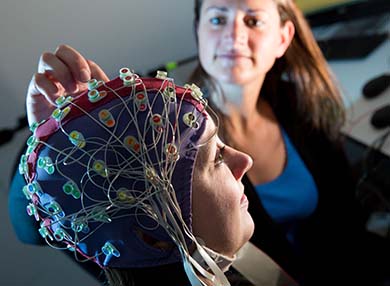 Led by Distinguished Professor David McAlpine, this program aims to develop a deep understanding of how humans interact with their world through sound and the sense of hearing.
Led by Distinguished Professor David McAlpine, this program aims to develop a deep understanding of how humans interact with their world through sound and the sense of hearing.
Our researchers explore the neural basis of listening to advance the design and implementation of listening technologies for hearing devices. To comprehend the intricacies of the listening brain we employ a wide range of techniques and approaches including:
- in vivo experimental data
- brain imaging
- modelling.
- Predicting and optimising outcomes in cochlear implant users
- Forming and following auditory objects
- Listen and Learn – Statistical Learning and the Adapting Auditory Brain
- Autism and the adapting auditory brain
- Brain connectivity in hearing loss.
Neural loops
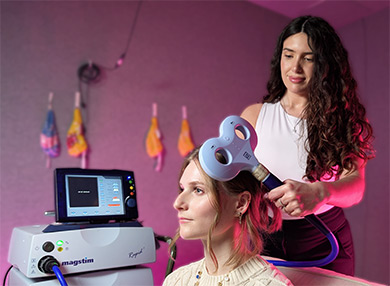 Neural loops is a core research program within the Efferent Systems Lab, aimed at uncovering how the feedback loops in the brain shape what we hear through both internal and external mechanisms of modulation.
Neural loops is a core research program within the Efferent Systems Lab, aimed at uncovering how the feedback loops in the brain shape what we hear through both internal and external mechanisms of modulation.
This program and lab are led by Dr Sriram Boothalingam, who is cross appointed between Macquarie University and the National Acoustic Laboratories.
At its heart are studies on how the brain and ear work together to influence perception, examining how neural systems, such as auditory feedback loops, fine-tune incoming sound at the periphery. This branch focuses on the brain's built-in feedback loops that dynamically regulate hearing in real-world listening. A second branch explores how external neuromodulation techniques, such as transcranial magnetic stimulation (TMS), can be used to study sensory processing and brain-ear communication. Together, these approaches support a broader goal:
- to better understand the neural basis of hearing and communication
- to develop more precise, personalised tools for diagnosing and treating listening difficulties.
- Uncovering central gain mechanisms in the subcortex
- Developing a rapid, cheap, and informative hearing screening test
- Unraveling the functional relevance of feedback circuits in the brain
- Developing protocols for robust auditory transcranial magnetic stimulation
- The overworked listening brain: Investigations at the nexus of sleep, cognition, and hearing impairment.
Realistic assessment
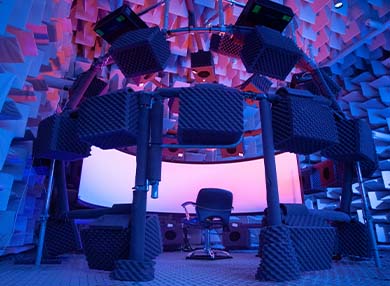 Led by Associate Professor Jorg Buchholz, the team’s vision is to solve the challenge of communicating in complex, noisy environments for individuals with listening difficulties.
Led by Associate Professor Jorg Buchholz, the team’s vision is to solve the challenge of communicating in complex, noisy environments for individuals with listening difficulties.
The program aims to understand and predict real-world communication to enhance hearing outcomes and develop devices suitable for complex environments. This is achieved by:
- reproducing real-world scenarios in laboratory and clinical environments
- creating novel assessments
- innovating technologies.
- The MOSAIC Study
- PRISM
- Comparing the benefits of hearing aids and cochlear implants in real-world listening environments
- Developing next-generation sensors for stress and fatigue monitoring in cochlear implant recipients
- Realistic assessment of hearing ability and device benefit: Visual speech benefit
- Speech-in-noise outcomes following stroke.
Vestibular
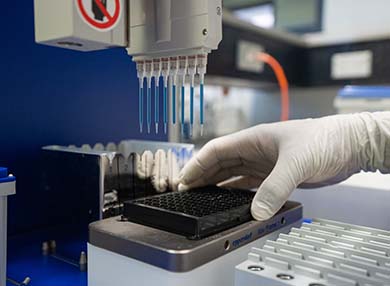 Led by Dr Christopher Pastras, the program aims to develop a deep understanding of the inner ear balance (vestibular) system, which is often impaired alongside its sibling sensory organ, the cochlea.
Led by Dr Christopher Pastras, the program aims to develop a deep understanding of the inner ear balance (vestibular) system, which is often impaired alongside its sibling sensory organ, the cochlea.
Experiments aim to provide a holistic understanding of peripheral and central balance function, and its relation to hearing and associated disorders. Outcomes are expected to advance knowledge in early detection, preventive strategies, and treatment to alleviate inner ear conditions.
These experiments will utilise:
- in vivo and in vitro electrophysiology
- biomechanics and modelling
- innovative technologies and devices.
- Novel tools to understand balance function
- Ménière’s disease research
Better language and communication for children with hearing loss
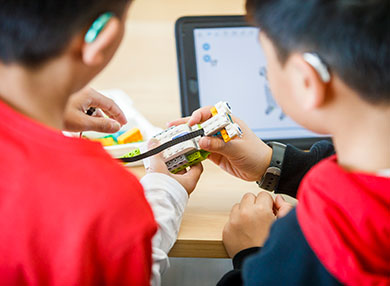 This program of research aims to understand communication breakdowns by identifying the locus of linguistic challenge to help inform practice.
This program of research aims to understand communication breakdowns by identifying the locus of linguistic challenge to help inform practice.
This is achieved by using a range of psycholinguistic approaches including:
- bespoke comprehension assessments using eye-tracking
- speech analysis technology
- cognitive and executive functioning
- norm-referenced assessments.
- Beyond speech – towards better communication for children with hearing loss.
- Improving the language outcomes of Mandarin-speaking children with hearing loss.
- Investigating processing speed for spoken and written language in deaf and hard of hearing schoolchildren.
Population and health
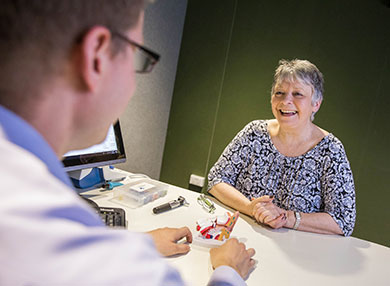 Led by Macquarie University Cochlear Chair in Hearing and Health, Professor Bamini Gopinath, the research team aims to bring a public health lens to hearing research in order to better understand how hearing problems affect health and social outcomes.
Led by Macquarie University Cochlear Chair in Hearing and Health, Professor Bamini Gopinath, the research team aims to bring a public health lens to hearing research in order to better understand how hearing problems affect health and social outcomes.
We work to identify and implement viable, evidence-based solutions that will address the impacts of adult-onset hearing loss and the low uptake of hearing services and interventions, translating into healthy ageing.
A major area of focus for the next five years is to provide evidence to resolve the clinical and scientific uncertainty for the treatment and management of adult-onset hearing loss. This goal will be achieved through key initiatives, such as:
- a national database on hearing loss
- a national digital portal on hearing loss.
- The Australian Eye and Ear Health Survey.
- Hearing impairment in adults: A longitudinal outcomes study (HALOS).
- Data analytics for better hearing health care.
- Profiling hearing loss among cochlear implant recipients.
- Adult recipients of cochlear implants (ARCHS).
- Developing a new quality of life measure for hearing impairment.
Learn more about the population and health research projects.
Translational research
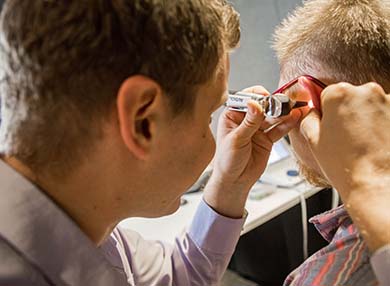 Led by Dr Diana Tang and Professor Bamini Gopinath, this program focuses on collaboration with key stakeholders – including consumers and consumer organisations – to deliver supports that enable adults with hearing loss to optimally participate in their communities and maintain their independence and quality of life.
Led by Dr Diana Tang and Professor Bamini Gopinath, this program focuses on collaboration with key stakeholders – including consumers and consumer organisations – to deliver supports that enable adults with hearing loss to optimally participate in their communities and maintain their independence and quality of life.
This program is underpinned by the principles of co-design where we combine lived experience and professional expertise to development interventions that are acceptable, feasible and scalable.
- Walk, Talk and Listen
- Movement, Interaction and Nutrition for Greater Lifestyles in the Elderly (MINGLE)
- Hear4Health
- Digital Literacy Program Empowering Seniors with Sensory Loss
- SOUND-BITES
Aboriginal children’s hearing health
 Led by Professor Catherine McMahon, this program uses a multidisciplinary and community-engaged approach, to solve major hearing health problems that translate into measurable and impactful change.
Led by Professor Catherine McMahon, this program uses a multidisciplinary and community-engaged approach, to solve major hearing health problems that translate into measurable and impactful change.
The aim of the program is to reduce avoidable deafness for Aboriginal children by improving early detection and ensuring access to person-centred and family-centred care.
- Improving care pathways for otitis media in Aboriginal children (0–12): A case study approach.
- Listening and Language in Aboriginal Children (LiLAC).
- Scalable hearing rehabilitation for low- and middle-income countries.
- Little Ears Aboriginal Programs – Hearing and EAR Screening (LEAP-HEAR).
- Systematically, Together Overcoming Racism Model (STORM).
Learn more about the Aboriginal children’s hearing health program.
EMCR Grassroots Network
Our mission is to foster collaborative research and innovation among early-to-mid-career researchers within the Macquarie University Hearing Grassroots Network. We aim to:
- create a dynamic platform that promotes knowledge exchanges, interdisciplinary collaboration, and impactful discoveries in hearing health and communication sciences
- advance scientific understanding, develop innovative solutions, and improve the lives of individuals affected by hearing and auditory processing difficulties in Australia and beyond.
Our growing network currently includes members from across the University, with initiatives including:
- the launch of our Macquarie University Hearing Research Centre EMCR Grant Support Scheme 2023
- support of students to attend the Acoustics 2023 Society conference
- the Larry Marlow Leadership workshop, scheduled for 2024.
See more information about our Co-Chair members.
Contact us to get involved: grassrootsnetwork@mq.edu.au